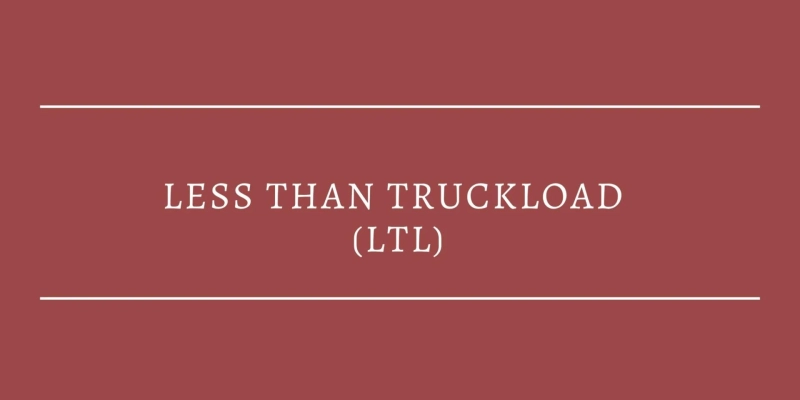Introduction to Less Than Truckload (LTL)
In today's ecommerce world, it's important to be aware of all shipping options available to you. One option that is often overlooked is Less Than Truckload shipping. In this post, we'll break down what LTL shipping is and how it can benefit your business. We'll also discuss some of the pros and cons of using LTL shipping, so you can decide if it's the right choice for you.
What is less than truckload shipping and how does it work?
Less than truckload shipping, or LTL shipping, is a type of freight shipping that involves transporting smaller shipments than a full truckload. LTL shipments are typically too large to send through the mail or to be carried by an individual, but too small to fill up an entire truck. As a result, LTL shipments are transported using a special type of truck known as an LTL carrier.
There are two primary methods of shipping LTL freight: through a shared truck and through a dedicated truck. When shipments are transported through a shared truck, they are combined with other shipments from different businesses to fill up the truck.
This allows businesses to save money on shipping costs, as they only have to pay for a portion of the truck. However, it can also result in longer shipping times, as the truck may make multiple stops to pick up and drop off different shipments.
Dedicated truck shipping involves renting an entire truck for a single shipment. This is typically more expensive than shipping through a shared truck, but it guarantees that the shipment will not have to be combined with other shipments and will arrive at its destination more quickly.
LTL shipping is a popular option for businesses that need to ship large items but do not have enough freight to fill an entire truck. It is also a good option for businesses that need to ship freight on a regular basis but do not have the storage space to keep a full truckload of inventory on hand.
What are the benefits of using LTL shipping over other methods?
LTL shipping, or less-than-truckload shipping, is a type of trucking service that allows businesses to ship smaller loads of freight at a lower cost than full truckload (FTL) shipping.
LTL shipping is often used for shipments that are too large for parcel carriers like UPS or FedEx, but too small to fill an entire truck. The benefits of using LTL shipping for businesses include lower shipping costs, faster transit times, and more flexible delivery options.
Lower Shipping Costs: Because LTL shipments are consolidated with other shipments going to the same general destination, businesses can save on shipping costs compared to FTL shipping.Faster Transit Times: LTL shipping transit times are typically faster than FTL shipping because the shipments do not have to be unloaded and reloaded at multiple stops along the way.More Flexible Delivery Options: LTL carriers often offer more flexible delivery options than FTL carriers, such as guaranteed delivery times and Saturday delivery.Enhanced Tracking and Visibility: Most LTL carriers offer enhanced tracking capabilities that allow businesses to track their shipments in real-time. This can help businesses keep tabs on their inventory and ensure that shipments are delivered on time.Greater Capacity: LTL carriers typically have greater capacity than parcel carriers, which can be beneficial for businesses that need to ship large quantities of inventory.Overall, there are many benefits of using LTL shipping over other methods. Businesses that are looking to save money on shipping costs, improve transit times, and get more flexible delivery options should consider
How to choose the right LTL carrier for your business?
There are a few things to consider when choosing the right LTL carrier for your business. One of the most important factors is the volume of freight you need to move. You also need to consider the type of goods you are shipping, as well as the distance.
Another thing to keep in mind is the price. It's important to find a carrier that offers competitive rates without compromising on quality or service. You should also consider the reputation of the carrier, as well as their track record for on-time deliveries.
It's also important to find a carrier that can accommodate your scheduling needs. Some carriers offer same-day or next-day delivery, while others may have longer lead times.
Finally, you'll want to make sure the carrier you choose has the necessary insurance and licensing in place. This will protect your business in case of any damages or losses during transit. By taking all of these factors into consideration, you can be sure to find the right LTL carrier for your business.
Conclusion paragraph
If you’re looking for a more cost-effective way to move your goods, Less Than Truckload (LTL) shipping may be the answer. LTL shipping is a great option when you have a small shipment that doesn’t require the use of an entire truck. By using an LTL carrier, you can save money on freight costs and get your goods to their destination in a timely manner.
We hope this article has helped you better understand what LTL shipping is and how it can benefit your business. Are you ready to get started? Contact us today to learn more about our LTL services and see how we can help streamline your shipping process.
0



